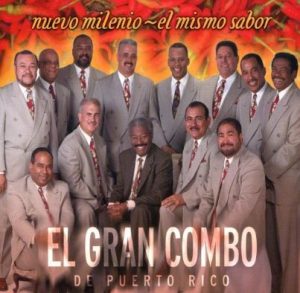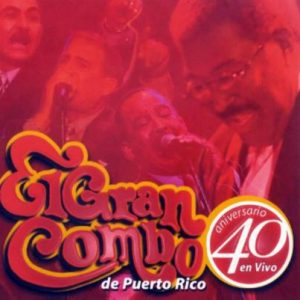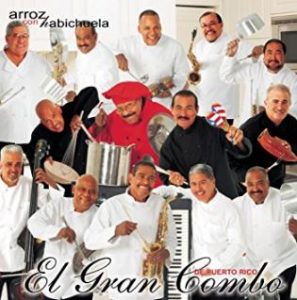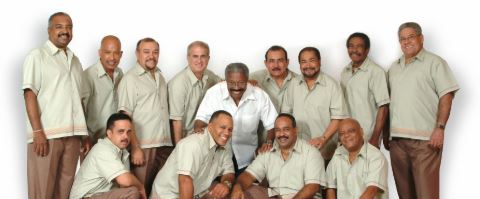This post is also available in:
 Español
Español
As El Gran Combo rolls into their 5th decade of existence, they slow down to their smallest number of recordings in their history.
Used to release at least a dozen albums per decade, El Gran Combo will fall way short of half a dozen during the first decade of the new millennium.
El Gran Combo in the New Millennium; More of the Same

Rafael Ithier starts the new millennium with the 2001 launch of “Nuevo Milenio; El Mismo Sabor” (New Millennium; Same Flavor). This would’ve been great if the same flavor had been good, but the fact is that it was a bit dormant.
Like most of the previous recordings focusing on romantic themes, the albums had a couple of songs that got good airplay on the radio but were rarely memorable. The biggest hit in “Nuevo Milenio” was “Me Liberé”, performed by Jerry Rivas. The rest of the songs were a mix of OK and mediocre.
The same fate occurred with “Aquí Estamos y…De Verdad” (Here we are and…for Real), launched in 2004. These two albums, as well as the last two recordings of new material in the 90s, were overall forgettable albums. However, it’s worth noting the sound of El Gran Combo was still vibrant. The song selection might have not been the right one, but the sound was still there. I think this must have caused confusion to Ithier and his “mulatos“.
El Gran Combo’s 40th Anniversary Live Recording

In 2002 El Gran Combo celebrated its 40th anniversary. As per their tradition of celebrating an anniversary every 5 years, they held a celebratory concert in Bayamon, Puerto Rico, which was recorded live. The album “40 Aniversario en Vivo” earned them a Grammy for Best Tropical Album in the 2003 Grammy ceremony.
The album had two medleys with great guest singers. The most popular medley was the one with Gilberto Santa Rosa, where he sang the late Pellín Rodriguez hits of “Maldito Callo”, “A Ti Te Pasa Algo”, “Masculino y Femenino”, and “El Caballo Pelotero”. Hi finished the medley with the Jerry Rivas hit “No Hago Mas Na'”.
The other medley was performed by ex-Gran Combo member Andy Montañez, where he sang his old hits “La Muerte”, “Vagabundo”, “Julia”, and one of Roberto Anglero’s most famous compositions “Las Hojas Blancas”.
The album did very well commercially and on the airwaves. As a curiosity, this was the only album of El Gran Combo recorded for the BMG label.
Back to ‘Rice and Beans’
Still recording and releasing albums at a slower pace than in previous decades, El Gran Combo released “Arroz con Habichuela” in 2006. The title song was written by a young Cuban singer-songwriter and bass player, who has his own band Havana-San Juan. Juan Jose Hernandez gave this song to El Gran Combo along with two other ones.
Except for the first single of the album “No Hay Manera”, Juan Jose wrote the next three hit singles of the album with the title song (which was the most memorable of the album), “Si La Ves Por Ahi”, a nice bomba song, and “Te Veo Nena” the #4 single and perhaps my favorite song of the album performed brilliantly by Charlie Aponte.
This album climbed to #1 in the Billboard Latin Tropical Albums chart in 2006 and won the Latin Grammy for “Best Salsa Album” in 2007.
“Arroz con Habichuela” felt like if El Gran Combo was finally back! Even though it was the 4th album of the decade (in 2006), it had this “comeback album” feel to it. That’s how much different it felt from the previous recordings.
So..what changed in El Gran Combo?
From my viewpoint, two things could have tilted the scale in favor of this album.
First, the song selection was much, much better than on previous recordings. The three songs by Juan Jose Hernandez were all big hits. Additionally, Rafy Monclova provided another three songs all good ones, including the first single “No Hay Manera”. Another good p from veteran songwriter Ramon Rodriguez (Conjunto Clasico) with “Piensalo”.

None of these songs are the kind of romantic themes where the guy is…oh so passionately in love with the perfect and beautiful woman that his heart has melted and…, well, you know how that goes.
Some of these songs are romantic, but skip the platonic element that makes some of the Salsa Romantica so….”monga“. For example, “Si La Ves Por Ahi” is a nice “bomba”, about seeking a woman, but it’s written more from the urban street standpoint than from the platonic point of view. On the same token, “Peinsalo” is almost a plea, but it’s as if you could almost hear Luigi Texidor in the back saying “si no me quieres, me ahorco con los pies; que va, sabras querida que no” in Bobby Valentin’s “Linda Teresa“.
Other songs are about broken hearts, and, as I said, my favorite is “Te Veo Nena”. In that same vein is Julio Castro’s “Yo No Mendigo Amor”, which Jerry Rivas performs excellently.
And then there is “Arroz con Habichuela”. The most popular song on the album has nothing to do with love. Rather, it is about making Salsa the right way. This brings us to reason #2.
The second reason I think the album did well was the aggressive arrangements. Again, the song selection helped to set the stage. You can only be aggressive up to a certain point in a romantic song. But these songs provided space for more “Salsa dura” arrangements.
New Member to El Gran Combo
As Rafael Ithier entered the decade to celebrate his 74th birthday, the conversations about how much longer he could remain in the piano seat grew. It was in 2006 when his replacement on the instrument, Willie Sotelo, joined El Gran Combo. Sotelo came from being director of the very successful Frankie Ruiz orchestra.
Willie Sotelo quickly learned to play in the style of Rafael Ithier and his debut recording would be no other than in “Arroz con Habichuela”. Because of his experience as musical director, Willie would have a significant impact on El Gran Combo in the years to come.
Another member that perhaps officially joined El Gran Combo in this decade was bongo player Richie Bastar. The son of Kako, Richie did his recording debut with “Nuevo Milenio, El Mismo Sabor“.
..and that was it!
“Arroz con Habichela” was the last recording of the decade for El Gran Combo. The much-anticipated follow-up to their biggest hit album of the year would have to wait 4 long years.
Note: there was an album released in 2008 titled “From the Beginning” which was a compilation of songs from 1962 to 2007 to celebrate the 45 years of El Gran Combo.
The decade of the 2010s would start with El Gran Combo applying the same formula as in their last album. Would it work the same way?
Please follow us to the next chapter (the 2010s) of the History of El Gran Combo.


[…] History of El Gran Combo: the 2000’s […]